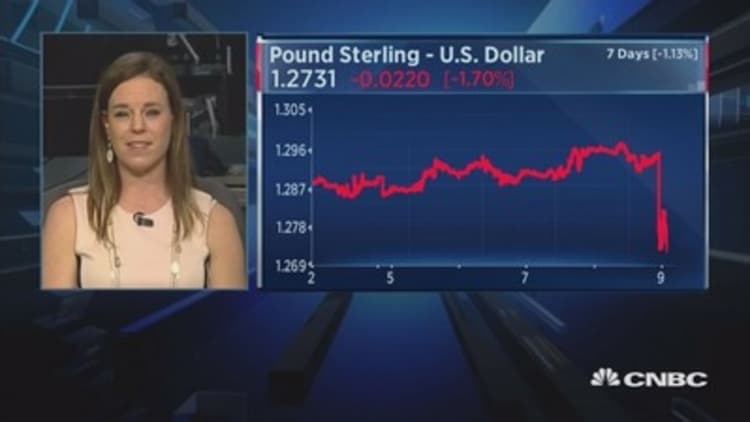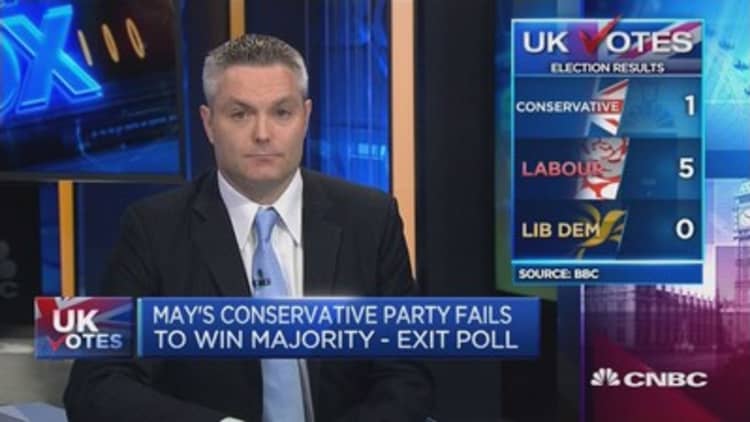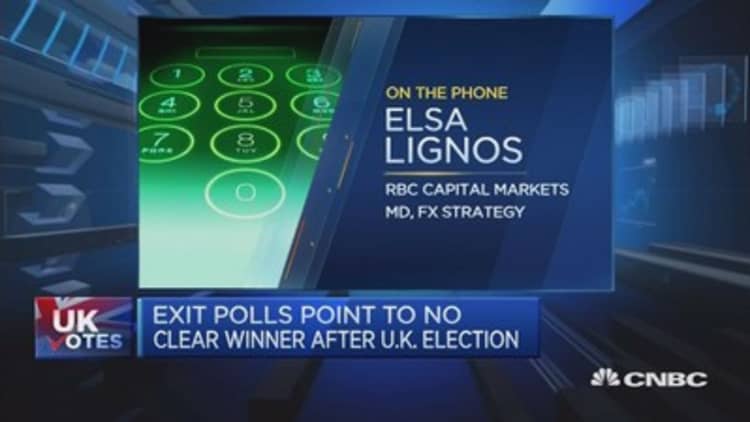
The British pound has fallen sharply following results of the U.K. election which show the ruling Conservative party has failed to reach of a majority in the British Parliament.
Cable (GBP/USD) fell from levels as high as $1.2977 on Thursday to a multi-month low of $1.2632 on Friday morning London time. The currency pair pared some of its losses to trade at $1.2742 at 11:15 a.m. London time in volatile trade, after fluctuating overnight during Asian trading hours. Earlier, the pound fell more than 2 percent against the greenback.
The euro strengthened against the pound, with euro/sterling cross trading up 1.48 percent at 0.8770.
As no party has secured an outright majority, Britain is facing a hung parliament. However, Sky News reported Friday morning that the Conservatives have already contacted the DUP (Democratic Unionist Party) and agreed a coalition deal. U.K. leader Theresa May is expected to seek permission from the Queen to form a new government on Friday.
Analysts have said that a hung parliament could see the pound fall further.
Tapas Strickland, an economist at the National Australia Bank, said in a note that consensus was for "further downside risks to sterling with a median expectation of $1.2350 in the event of a hung parliament."

Meanwhile, John Gorman, managing director of rates trading at Nomura Securities, said a hung parliament was the worst-case scenario, which could push the pound down to the mid-$1.20s.
"That would obviously be something that nobody wants," he told CNBC's "Squawk Box" on Friday.
Gorman added: "At the end of the day, I think we're probably going to get some sort of a coalition or a majority, it's just going to be too slim. And then it questions: Is there going to be gridlock in the U.K. government? Is there going to be a change of leadership in the U.K. government? And that's not an ideal situation. But once the dust settles, there is going to be this idea that the markets are going to be pricing in a softer Brexit and that's going to be better for the sterling."
Other analysts were also bearish on the currency.
Elsa Lignos, managing director of foreign-exchange strategy at RBC Capital Markets, noted that the pound had priced in a premium since the snap election was called in mid-April, as markets assumed a Tory victory.
"Effectively, markets moved very quickly to price in a Tory majority. Now, we've unwound about half of that," she told CNBC's "Squawk Box" on Friday, citing the $1.2550 level it traded just before the election was announced as a target.
But she noted that with a hung parliament, the pound would have further to fall.
"It's very unclear where we go from there," she said, citing uncertainty over parties' ability to form a coalition. "Given that uncertainty, it's very difficult to aggressively jump in and buy sterling here."

Elsewhere, the gained 0.47 percent to 97.37 against a basket of currencies at 9:34 a.m. London time, as investors digested former FBI Director James Comey's testimony to the U.S. Senate.
NAB's Strickland said the testimony did not provide anything new to his pre-released statement.
"He did though leave just enough to continue the cacophony that has surrounded the president," he said, adding, "It will be up to the lawyers and Congress to decide whether the testimony supports an impeachable offence — soundings from Republicans who control both the Senate and the House suggest not and that's how the market interpreted it."
The euro, which has the highest weighting in the dollar index, fetched $1.1175 at 9:34 a.m. London time, climbing fractionally from an earlier low of $1.1171 but off a previous high of $1.1237. The European Central Bank earlier announced it would leave its benchmark interest rate unchanged, but cut inflation forecasts.
"Draghi reaffirmed that underlying inflation is expected to recover only gradually, and thus interest rates should remain unchanged for an extended period of time. He also maintained that the ECB stands ready to extend its QE program if necessary," Wei Liang Chang, a currency strategist at Mizuho Bank, said in a note.
Chang added the decision was a disappointment to markets anticipating stronger signals for a reduction in stimulus, which led to a sell-off in euro/dollar.
The yen, considered a safe-haven asset, fetched 110.31 to the dollar on Friday afternoon local time, staying relatively stable.
Among other major Asian currencies, the Australian dollar traded at $0.7535, down from an earlier high of $0.7546.
— CNBC's Leslie Shaffer, David Reid and Gemma Acton contributed to this report.



